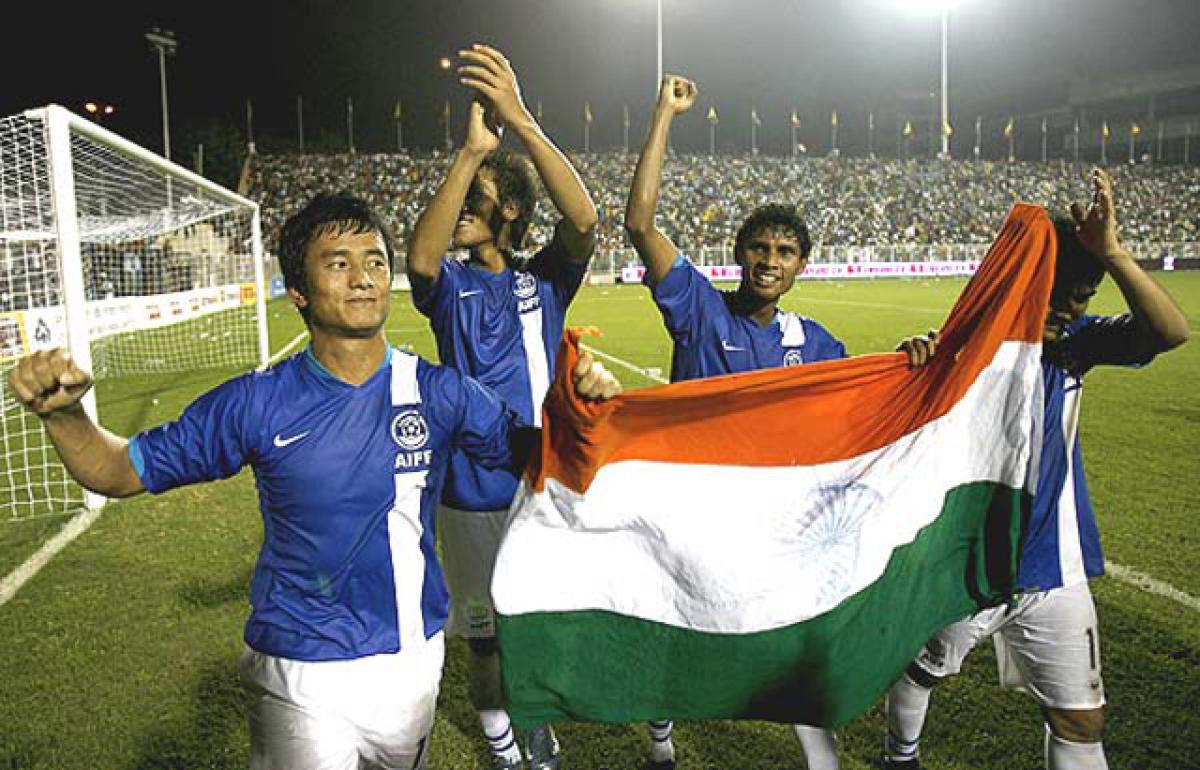Live
- BJP MP candidate Bharat Prasad visited the student who tried to commit suicide
- PM’s popularity in the fast lane: Autos with 'Har Dil Mein Modi' slogan spotted across Delhi
- Delhi-based political parties are like East India Company: Sukhbir Badal
- Golf: Diksha moves into Top-20 at South African Women’s Open
- KCR lashes out against BJP and Congress for destroying Telangana
- Dairy Science students visited the Milk cooling plant
- Moody feels Pant ahead in keepers’ race for T20 WC squad; Srikkanth picks Rahul over Samson as reserve keeper
- Thanking voters for extending 'unparalleled support' to NDA, PM Modi says second phase 'too good'
- Natural Relief for Menstrual Cramps: Beetroot Juice Recipe
- Asha Worker died in a road accident
Just In

Lack of football culture harming India’s growth. Indian football team coach Stephen Constantine has cited the absence of a thriving football culture in the country as a major impediment in its quest for its first World Cup appearance - despite a rich football history and a population of 1.2 billion people. He also claimed that India\'s woes was not just technical or physical but cultural.
There is no football culture in India. It's not about a question of fitness, skill or technique; rather it's a question of developing a football culture in the country. If one looks at the team that has won the World Cup (Germany), what do they all have in common? They all have kids playing with the ball from the age of two to three. It all starts from there
Indian football team coach Stephen Constantine has cited the absence of a thriving football culture in the country as a major impediment in its quest for its first World Cup appearance - despite a rich football history and a population of 1.2 billion people. He also claimed that India's woes was not just technical or physical but cultural.
.jpg)
India, currently ranked 141 in the world rankings, recently lost both their 2018 World Cup qualifying group's opening matches against Guam and Oman to all but end their slim chances of advancing to the next round of qualification. India, Guam, Oman, Iran and Turkmenistan are in Group D for the preliminary league with the top two finishers progressing to the next phase of the competition. There is no football culture in India.
It's not about a question of fitness, skill or technique; rather it's a question of developing a football culture in the country. "If you look at the team that has won the World Cup (Germany) what do they all have in common? They all have kids playing with the ball from the age of two to three. It all starts from there," said Constantine, who is currently enjoying his second stint as the national coach. He said not much has developed between his first stint as coach from 2002-05 and now.
The Englishman said incorporating Persons of Indian origin (PIO) footballers in the national side might yield positive results for the country. He said even before him joining the squad, he drew up a list of 30 players who have an Indian tie-up and said if two to three of those boys with major league experience would join, it would dramatically improve the standard of the Indian national team.
"It's not all of a sudden that I have come up with the PIO concept. It's been in my mind since day one I have joined. Before I came I drew up a list of 30 players who have an Indian tie-up. If you can get two to three of these boys with major league experience it will improve the Indian national team overnight. But whether we are allowed to use them or not is a different story," he said.
He said the Indian government should analyse the PIO concept for the betterment of the game. "Football is the biggest game in the world. If Indians abroad can help improve our standings in world football, I think, there's every reason we should look at it," he explains. In his last assignment as coach with east African country Rwanda, he improved the country's rankings from 134 to 64 within a year.
When asked if India is capable of making such a move under his guidance in the near future, he said, "I see India as a huge challenge. I strongly believe we are more than capable of climbing the FIFA rankings. However, the difference between India and Rwanda is visible in every corner of the country. In Rwanda, in every corner they play football and we also had a scouting system that enabled us to identify, record, monitor and assess."
"We have kicked off here as well. Our scouting programme has already discovered more than 25 players for the FIFA 2017 U-17 World Cup squad and another five for the U-19 squad. The scouting team is already on their job and spot on as well."
The 52-year-old said Indian football's new-born child Indian Super League (ISL) is a good platform for the home-grown players to train with top foreign footballers but said a thorough system should be put in place for selecting the foreign recruits. After a successful inaugural season, where franchise Atletico de Kolkata emerged champions, the second season of ISL is scheduled to begin on October 3.
By Aritra Chowdhury

© 2024 Hyderabad Media House Limited/The Hans India. All rights reserved. Powered by hocalwire.com







